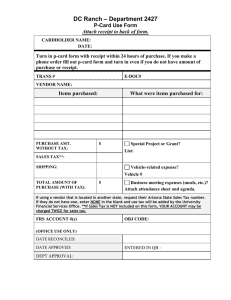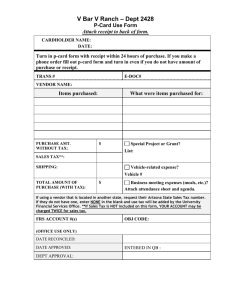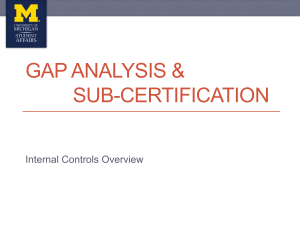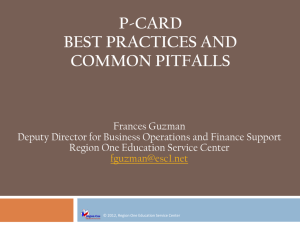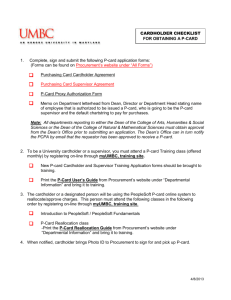Expert Knowledge Elicitations in a Procurement Card Context:
advertisement
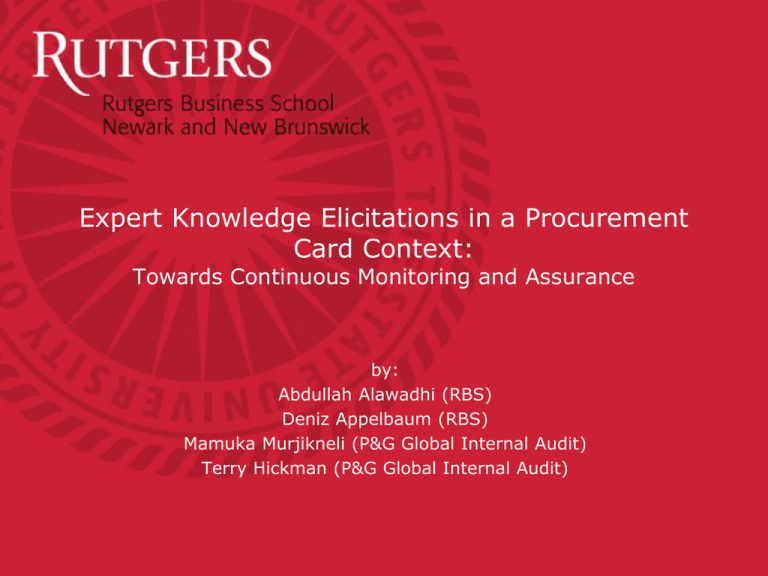
Expert Knowledge Elicitations in a Procurement Card Context: Towards Continuous Monitoring and Assurance by: Abdullah Alawadhi (RBS) Deniz Appelbaum (RBS) Mamuka Murjikneli (P&G Global Internal Audit) Terry Hickman (P&G Global Internal Audit) AGENDA • INTRODUCTION • THE DATA • P-CARD MISUSE DETECTION • MOVING FORWARD • CONCLUSION 2 INTRODUCTION • Why P-card has higher fraud risk than employee credit card? – P-card owners have a higher number of transactions on a normal basis, while employee credit card usage is typically linked to event or a business trip. – For P-card transactions, no pre-approval is required, while normally employee credit card transactions need to be approved by the manager before AMEX gets reimbursed. – Values involved are higher due to type of goods/services purchased, which drives pressure to commit fraud. – Difficulty to detect misuse increases opportunity, which, together with the pressure, constitute two out of three fraud triangle factors. 3 INTRODUCTION • P&G’s team currently analyzes pro card data for misuse manually, hence the desire to design a system that would automate the process • Main objective: – The elicitation of an expert’s knowledge by conducting unstructured interviews and ultimately build an expert system to detect p-card misuse 4 THE DATA • The data file obtained details every transaction from the preceding month of employee p-card use, and averages about 50,000 transactions with 51 attributes • Data obtained is monthly 2013 data starting from April till July • Some of the data fields have missing values 5 P-CARD MISUSE DETECTION - Analysis • Firm's Procurement Process Cardholder makes purchase with P-Card Purchase is copied from the bank’s credit system and posted to the firm’s ERP system The bank is paid P-Card team downloads all transactions and uploads for management review Manager marks transactions reviewed or requests more information. • Auditor’s Monitoring Process Auditor obtains monthly list of P-Card transactions Auditor manually reviews P-Card transactions for any suspected red flags Auditor marks red flagged transactions and submits them to HR HR will follow up and send feedback to Auditor 6 P-CARD MISUSE DETECTION - Analysis • The project requires elicitation of an expert’s knowledge Data and Project Analysis •Familiarity with data and project requirements •Analysis of texts and documents; exploratory tests Special Tasks •Yields continued refinements to the system, continuous methodology Unstructured Interviews •Gains more knowledge from the experts •Yields enough information for first pass test data base Preparation of Second Pass Tests •Refinement of the test file •Results of file scripts compared to those of the control, the expert's knowledge Preparation of First Pass Test •Beginnings of project file •Continual refinement of rules based scripts More Interviews •Unstructured and Structured •Yields enough information for second pass tests 7 P-CARD MISUSE DETECTION - Results • First test was textual analytics. By having certain keywords marked as inappropriate, we were able to filter those out. • One case (highlighted in red) identified immediately as fraudulent by the company 8 P-CARD MISUSE DETECTION - Results • One of the main challenges of this project was of designing an expert knowledge system where a key data field, such as purchased item description, is missing • For example, a major vendor opts to not provide any item description information. – Management needs to put more consideration in such cases were the opportunity to commit fraud is more apparent 9 P-CARD MISUSE DETECTION - Results • Examples of some rules used: IF [MCH_Merchant_Category_Code] EQUAL 4900 AND [MCH_Merchant_Name] NOT EQUAL “Waste Management” OR “Suburban Propane” AND [Department_Cost_Center] OR [Department_Name] CONTAINS “PLANT” OR “Manufacturing” OR “BUILDINGS/GROUNDS” THEN FAIL IF [MCH_Merchant_Category_Code] EQUAL (RANGE:7829-7999) AND [Department_Name] NOT EQUAL “NATIONAL GOVERNMENT RELATIONS” AND [MCH_Merchant_Name] NOT EQUAL “CAPITOL HILL CLUB” THEN FAIL 10 P-CARD MISUSE DETECTION - Results • Over the last few months the system detected three fraudulent cases during the testing phases alone • The initial first run of the expert system produce a total of 1408 exceptions • After reviewing the exceptions with the experts, 68% were considered legitimate red flags and would require further investigation 11 MOVING FORWARD • Further refine rules with the experts, and run the system on new data • Building user purchase behaviors by applying pattern recognition and utilizing visualization scenarios to assist in outlier detection. • Higher risk factors will be assigned to: – Certain predefined types of pattern changes. – Differences in individual purchase patterns vs. the cluster aggregate. 12 MOVING FORWARD • Examples of some visualization scenarios we created to help in building user purchase behaviors: • The most heat (color) intensity among the states goes to Ohio, i.e. it has 64% of the total dollar amounts spent. 13 MOVING FORWARD • By aggregating dollar amounts per transaction for both merchants and employees, we can further understand the data and be able to build better purchase patterns 1,106 Transactions Only 8 Transactions • One example here is employee T2472, were despite being third place in terms of total dollar spending ($424,879), has only 8 records in total 14 CONCLUSION • The project is still a work in process, primarily due to the complexity of rules and transactions that must be gleaned in this outlier detection process • Furthermore, these tests can be applied on a continual basis, contributing to the continual journey of expert knowledge elicitation in a continuous auditing and monitoring environment • Moving forward we plan on applying different analytics for misuse detection such as building user purchase behaviors 15 16
